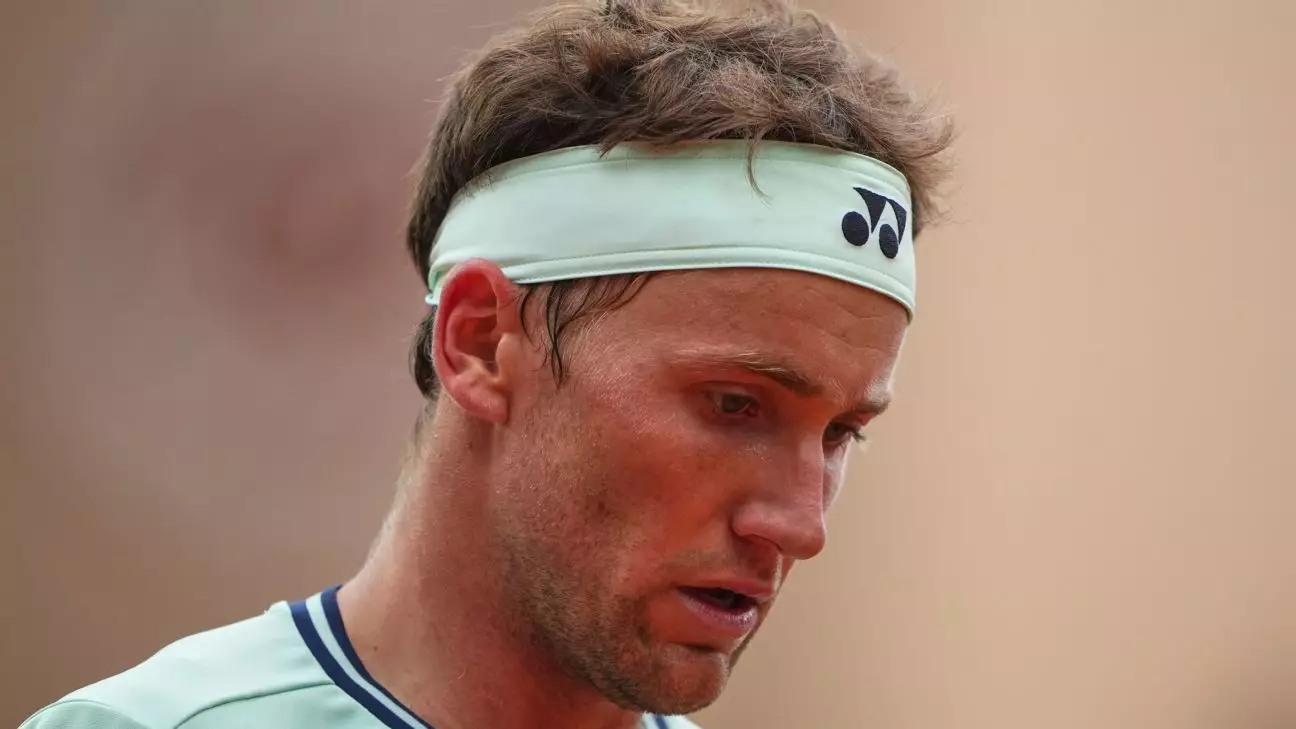Casper Ruud’s journey in the realm of professional tennis has been nothing short of remarkable, yet his recent battle with a debilitating knee injury has cast a shadow over his potential glory at the French Open. The two-time finalist entered this year’s tournament gripping a metaphorical crutch of pain, following a season mired by discomfort and instability. His early exit in the second round against Nuno Borges, losing after dropping 13 of the last 14 games, starkly contrasts with his previous performances in Paris. This isn’t just a defeat on the scoreboard; it’s a testament to the relentless struggle that elite athletes often face behind the scenes.
It’s essential to understand the context around Ruud’s performance. When he reached the semifinals three consecutive years prior and stood as a finalist against titans like Rafael Nadal and Novak Djokovic, expectations were sky-high. The expectation to produce under pressure can be unbearable, particularly when physical health is compromised. Ruud’s recognition of his pain during matches speaks volumes to the mental tenacity required in professional sports; it also highlights the physical limitations he faced, which ultimately impacted his gameplay.
The Shadow of Injury Looms Large
Ruud’s concession to injury raises questions about the human aspect of sports that often gets overshadowed by dramatic comebacks and high-stakes victories. His admission of pain – specifically mentioning the challenges posed by an open-stance backhand – reveals the intricate relationship between an athlete’s body and technique. Each shot taken is a calculated risk, and Ruud’s strategy of avoiding painful movements demonstrates a profound understanding of self-preservation, even if it restricts his natural playing style.
Despite his efforts to manage the ongoing discomfort with painkillers and anti-inflammatories, Ruud’s performance ultimately betrayed him. The anguish of recognizing one’s limitations during competition can be mentally taxing. No longer a robust competitor subduing his opponents, he finds himself constantly battling his own body. The phrase “I wish I could stay here longer” echoes a sentiment shared by many athletes who face the dual struggle of striving for greatness while experiencing the constraints of physicality.
The Brightness of Oblivion: Nuno Borges’ Rise
On the other side of the court, Nuno Borges emerged victorious, marking a significant milestone in his own career as the first Portuguese man to reach the French Open’s third round. His victory wasn’t just a fluke; it was a culmination of skill and resilience against a wounded giant. Borges capitalized on Ruud’s vulnerability, demonstrating that fortune favors the brave – and in this case, the prepared.
The contrast between their journeys is compelling. Borges exhibited a sense of confidence and aggression that allowed him to navigate the treacherous waters of high-stakes competition. Ruud, meanwhile, embodies the idea that even champions are not immune to defeat when the body betrays them. The narrative of Borges, overcoming not just the match but also the emotional charge of facing a two-time finalist, is a stark reminder of the unpredictability in sports – an arena where the victor is often determined not solely by skill but by circumstance.
The Champions’ Mentality: Learning Through Adversity
The plight of both players underscores a broader truth within athletics: resilience is forged in the crucible of hardship. Ruud’s introspection about his performances during this match reveals a mental fortitude that separates ordinary athletes from champions. Rather than wallowing in disappointment, he articulated the challenges he faced, showcasing a level of maturity and insight that will ultimately serve him well in future endeavors.
Moreover, Carlos Alcaraz’s simultaneous match showcased the dual nature of competition – while one athlete was beset by adversity, another, the defending champion, navigated through their challenges with finesse. Alcaraz’s victory despite experiencing difficulties illustrates an important point: that overcoming obstacles is an aspect of greatness. To maintain composure and success amid adversity speaks volumes about character.
This dual narrative offers a profound understanding of the human spirit that resonates beyond tennis. In every failure lies a chance to grow; in every injury, an opportunity to evolve. As Casper Ruud recovers and analyzes his experience from Roland Garros, he will not only focus on physical healing but will also cultivate the mental strategies that can transform hardship into triumph. The path of an athlete is rarely linear, but it is the lessons learned in trying times that define true greatness.

